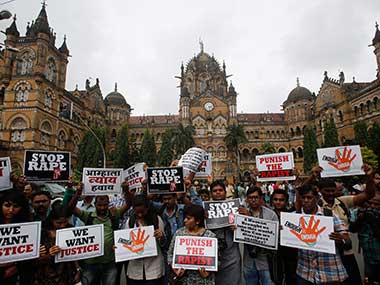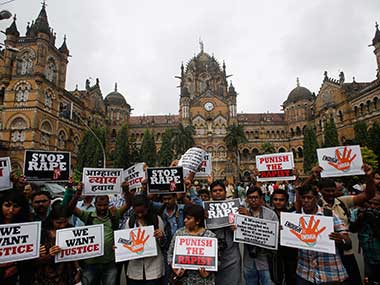The young photo-journalist was not the first woman to be raped by her attackers in Shakti Mills. “During his interrogation, Bangali told us that they [the 5 suspects] had raped four rag pickers at the same spot where the 22-year-old was gang-raped,” a Mumbai crime branch officer
told Hindustan Times
. Shakti Mills was not just another conveniently deserted location but a hunting ground for a gang of sexual predators. [caption id=“attachment_1061447” align=“alignleft” width=“380”]
 Rape protests in Mumbai. Reuters[/caption] These four other cases of gangrape went unreported, which likely emboldened the suspects to rape their latest victim: The group used to target rag pickers as garbage used to be deposited at the isolated Shakti Mills Compound, and several women rag pickers are known to segregate the garbage from the location, said the officer. “Bangali’s gang would take advantage of this and target rag pickers,” added the officer. “The cases have not been registered as the victims may have been too scared to report the incident.” This inconvenient fact raises several important questions about rape and class. Here’s one obvious question: Would we have cared as much if the four poor women did report the crime? The police, notoriously unresponsive in matters of rape, may scramble into action on a headline-making case, but is unlikely to show such alacrity when the victim is a lowly rag-picker. Certainly, the media coverage would have been far more muted. Over the past weekend, two other women have been gangraped in Haryana. One is a woman constable who was accosted in company of relatives when traveling with the body of a relative. The other was a 20-year old Dalit woman who was kidnapped, raped and killed in Jind, where she’d come to sit for a junior teacher’s test. Neither have sparked the same kind of media outrage. And one reason is that the English-language media’s target audience, i.e. the urban educated class, rarely pay attention to crimes against the lower classes. We assume that violence is included in the price of poverty, a package deal that comes with rape, murder, domestic violence included. And each sensational gangrape brings in its wake hand-wringing over this very insensitivity.When the Delhi case sparked protests, many pointed to the
11-year old Sikar
in Rajasthan who had lain in a hospital bed for months, her genitals torn apart, without any attention. The Mumbai case too has evoked similar responses, including
this eloquent essay
from Firstpost contributor Jay Mazoomdar, who writes, “Every assault that goes unpunished anywhere is an encouragement to rapists everywhere. It is really all or nothing — no woman will ever really feel safe if another does not.” Everyone pays lip-service to this notion, but how many of us actually believe it? We the educated professional class assume we can always buy protection - from police harassment, electricity cuts, water shortages, the vagaries of Indian life that the less privileged just have to lump. The safety of women is no exception. We are entirely wrong, and the rapes of the ragpickers underlines the high price of our deluded elitism. When predatory men can assault women with impunity, they are likely to continue to do so, irrespective of their intended victim’s class or caste. To Sheikh and his friends, a photo-journalist is no different from a rag-picker or maid. They did not hesitate because she was better educated or more likely to file a complaint. The sheer heady power of having gotten away with 4 rapes outweighed any calculations about class. When societies offer men a license to violence, they rarely exercise it with due deference to rank. And unless we create a society where rag-pickers feel as empowered to report rape as a photojournalist, no woman will be safe. But, but, but surely the Mumbai rapists were wrong. The very fact of their immediate arrests surely sends the message that ‘class privilege’ is alive and well. Glaringly so when we note the fact that the police is too busy lathi-charging the protesting the villagers in Jind to catch the “unidentified suspects.” We may like to think so, but the real message of the Mumbai gang-rape is that no woman is safe. When it comes to rape, class privilege does not protect women from assault, but offers them the luxury of “staying safe”. In this specific example, photojournalists can opt out of a location shoot in an abandoned mill unlike the rag-pickers who have no option but to risk their bodies to survive. Yet this so-called bubble of safety shrinks with every such incident. Now we can be raped in daylight hours not just after dark. We can be raped on buses not just isolated locations. We can be raped on assignment despite the presence of a male companion not just when we are foolish enough to venture out alone. As in post-Nirbhaya Delhi, in the months to come, women in Mumbai will “choose” to cede ever more freedom and public space to our potential attackers in order to stay “safe”. The less fortunate, however, will continue to brave abandoned mills, dark streets, and public transportation – and likely continue to pay the price. Sheikh and his buddies may be duly punished, but in the long run, the rapists will win. And they will continue to do so as long as we cling to our delusions of privilege.
Rape protests in Mumbai. Reuters[/caption] These four other cases of gangrape went unreported, which likely emboldened the suspects to rape their latest victim: The group used to target rag pickers as garbage used to be deposited at the isolated Shakti Mills Compound, and several women rag pickers are known to segregate the garbage from the location, said the officer. “Bangali’s gang would take advantage of this and target rag pickers,” added the officer. “The cases have not been registered as the victims may have been too scared to report the incident.” This inconvenient fact raises several important questions about rape and class. Here’s one obvious question: Would we have cared as much if the four poor women did report the crime? The police, notoriously unresponsive in matters of rape, may scramble into action on a headline-making case, but is unlikely to show such alacrity when the victim is a lowly rag-picker. Certainly, the media coverage would have been far more muted. Over the past weekend, two other women have been gangraped in Haryana. One is a woman constable who was accosted in company of relatives when traveling with the body of a relative. The other was a 20-year old Dalit woman who was kidnapped, raped and killed in Jind, where she’d come to sit for a junior teacher’s test. Neither have sparked the same kind of media outrage. And one reason is that the English-language media’s target audience, i.e. the urban educated class, rarely pay attention to crimes against the lower classes. We assume that violence is included in the price of poverty, a package deal that comes with rape, murder, domestic violence included. And each sensational gangrape brings in its wake hand-wringing over this very insensitivity.When the Delhi case sparked protests, many pointed to the
11-year old Sikar
in Rajasthan who had lain in a hospital bed for months, her genitals torn apart, without any attention. The Mumbai case too has evoked similar responses, including
this eloquent essay
from Firstpost contributor Jay Mazoomdar, who writes, “Every assault that goes unpunished anywhere is an encouragement to rapists everywhere. It is really all or nothing — no woman will ever really feel safe if another does not.” Everyone pays lip-service to this notion, but how many of us actually believe it? We the educated professional class assume we can always buy protection - from police harassment, electricity cuts, water shortages, the vagaries of Indian life that the less privileged just have to lump. The safety of women is no exception. We are entirely wrong, and the rapes of the ragpickers underlines the high price of our deluded elitism. When predatory men can assault women with impunity, they are likely to continue to do so, irrespective of their intended victim’s class or caste. To Sheikh and his friends, a photo-journalist is no different from a rag-picker or maid. They did not hesitate because she was better educated or more likely to file a complaint. The sheer heady power of having gotten away with 4 rapes outweighed any calculations about class. When societies offer men a license to violence, they rarely exercise it with due deference to rank. And unless we create a society where rag-pickers feel as empowered to report rape as a photojournalist, no woman will be safe. But, but, but surely the Mumbai rapists were wrong. The very fact of their immediate arrests surely sends the message that ‘class privilege’ is alive and well. Glaringly so when we note the fact that the police is too busy lathi-charging the protesting the villagers in Jind to catch the “unidentified suspects.” We may like to think so, but the real message of the Mumbai gang-rape is that no woman is safe. When it comes to rape, class privilege does not protect women from assault, but offers them the luxury of “staying safe”. In this specific example, photojournalists can opt out of a location shoot in an abandoned mill unlike the rag-pickers who have no option but to risk their bodies to survive. Yet this so-called bubble of safety shrinks with every such incident. Now we can be raped in daylight hours not just after dark. We can be raped on buses not just isolated locations. We can be raped on assignment despite the presence of a male companion not just when we are foolish enough to venture out alone. As in post-Nirbhaya Delhi, in the months to come, women in Mumbai will “choose” to cede ever more freedom and public space to our potential attackers in order to stay “safe”. The less fortunate, however, will continue to brave abandoned mills, dark streets, and public transportation – and likely continue to pay the price. Sheikh and his buddies may be duly punished, but in the long run, the rapists will win. And they will continue to do so as long as we cling to our delusions of privilege.
Why the four other victims of Mumbai rapists matter
Lakshmi Chaudhry
• August 26, 2013, 18:12:13 IST
The Mumbai suspects have confessed to raping ragpickers on four previous occasions at the exact same location. This inconvenient fact reveals the high price of our elitism.
Advertisement
)
End of Article